|
|
|||||||||||||||||||||
 |
|||||||||||||||||||||
|
Learn Hebrew |
|||||||||||||||||||||
|
|
|
||||||||||||||||||||
 |
||||||||||||||||||||||||||||||||||||||||||||||||||
|
After we eat the Afikomen, we pour the third cup of wine (the Cup of Redemption) and give thanks to the LORD for the fellowship and the meal we have shared (note that Jews normally do not say "grace" before meals (as do many Christians), but rather after they have eaten; and they do not "bless" the food, either, but rather acknowledge that God is the One who provides for their sustenance). We often read Psalm 126 at this time. |
||||||||||||||||||||||||||||||||||||||||||||||||||
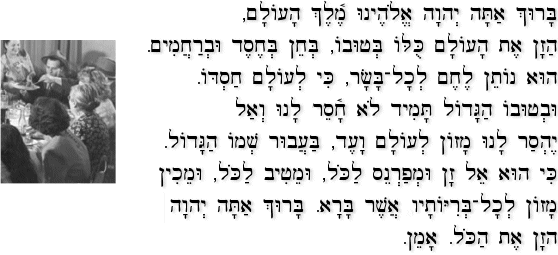 |
||||||||||||||||||||||||||||||||||||||||||||||||||
|
Blessed are you, LORD our God, master of the universe, Who nourishes the whole world in goodness, with grace, kindness, and compassion. He gives bread to all flesh, for His mercy endures forever. And through His great goodness we have never lacked, nor will we lack food forever, for the sake of His great Name. For He is God, who nourishes and sustains all, and does good to all, and prepares food for all His creatures which He created. Blessed are You, LORD, who nourishes all. Amen. |
||||||||||||||||||||||||||||||||||||||||||||||||||
|
Yearning for Mashiach |
||||||||||||||||||||||||||||||||||||||||||||||||||
|
The following prayer for the soon appearance of the Mashiach is included: |
||||||||||||||||||||||||||||||||||||||||||||||||||
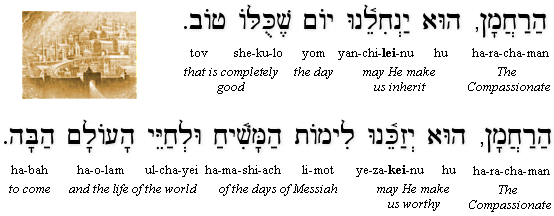 |
||||||||||||||||||||||||||||||||||||||||||||||||||
|
Harachaman, hu yanchileinu yom she-kulo tov. |
||||||||||||||||||||||||||||||||||||||||||||||||||
|
The Compassionate One! May He make us inherit the day that is completely good. |
||||||||||||||||||||||||||||||||||||||||||||||||||
|
The following portion is also recited: |
||||||||||||||||||||||||||||||||||||||||||||||||||
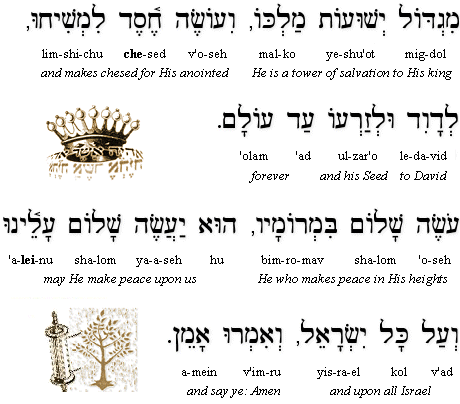 |
||||||||||||||||||||||||||||||||||||||||||||||||||
|
migdol yeshu'ot malko v'oseh chesed limshichu, l'david ul'zaro 'ad 'olam. |
||||||||||||||||||||||||||||||||||||||||||||||||||
|
He is a tower of salvation to His King, and He does chesed for His anointed, to David and his Seed forever. May He who makes peace in His heights make peace upon us, and upon all Israel. And say ye, Amen. |
||||||||||||||||||||||||||||||||||||||||||||||||||
|
We now make ourselves ready to partake of the third cup, the Cup of Redemption. We first read Matt. 26:27-28 and 1 Cor. 11:23-29. After the reading, we pause in silence.... "This Cup of Redemption represents God's New Covenant, Before drinking, we recite: |
||||||||||||||||||||||||||||||||||||||||||||||||||
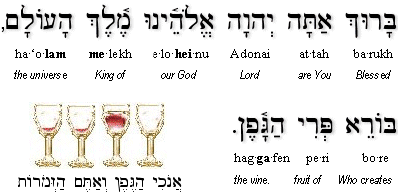 |
||||||||||||||||||||||||||||||||||||||||||||||||||
|
Barukh attah Adonai eloheinu melekh ha-olam, |
||||||||||||||||||||||||||||||||||||||||||||||||||
|
"Blessed art Thou, LORD our God, King of the universe, Creator of the fruit of the vine." |
||||||||||||||||||||||||||||||||||||||||||||||||||
|
Since the New Testament says explicitly that Yeshua took the bread and wine "after (the Passover) supper" (Luke 22:20, 1 Cor. 11:25) it is clear that this cup, the Cup of Redemption, is the one He raised when He said, "This cup is the New Covenant in my blood, which is shed for you" (Matt. 26:27-39). The Cup of Redemption commemorates the shed blood of the innocent lamb that brought redemption from Egypt, but it even more fully commemorates the greater redemption provided by the shed blood of Yeshua as Seh Elohim. |
||||||||||||||||||||||||||||||||||||||||||||||||||
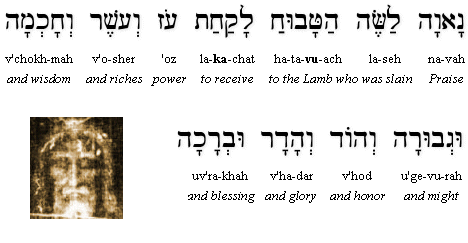 |
||||||||||||||||||||||||||||||||||||||||||||||||||
|
navah la-Seh hatavu'ach la-kachat 'oz v'osher v'chokhmah |
||||||||||||||||||||||||||||||||||||||||||||||||||
|
Worthy is the Lamb who was slain, to receive power and wealth and wisdom and might and honor and glory and blessing! (Rev. 5:12) |
||||||||||||||||||||||||||||||||||||||||||||||||||
|
Note: Jesus told his disciples that He would not drink the fourth cup (the Cup of Restoration), but promised to do so with them in the coming Kingdom (Matt. 26:29), after the Great Tribulation when "all Israel shall be saved." Maran ata! |
||||||||||||||||||||||||||||||||||||||||||||||||||
|
Hebrew for Christians |
||||||||||||||||||||||||||||||||||||||||||||||||||
|
||||||||||||||||||||||||||||||||||||||||||||||||||